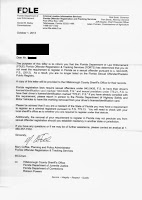 |
| Fourth Amendment |
Tampa Criminal Attorney notes, On Monday, November 4, 2013, the Supreme Court laid down a decree that further minimizes a person’s Fourth Amendment right to be free from warrantless searches and seizures by law enforcement. The case in question is Stanton v. Sims. While the case was a civil claim for damages under 42 U.S.C. § 1983, Civil Rights, it will have ramifications in criminal cases as well.
The circumstances surrounding Stanton v. Sims are that Officer Mike Stanton responded to a call regarding an unknown disturbance involving a person with a baseball bat. As Stanton neared the area where the disturbance had been reported, three men were walking in the street. The neighborhood had a reputation for “violence associated with the area gangs.” Two of the men ran upon seeing Stanton’s marked police vehicle. The third man, Nicholas Patrick, crossed in front of the marked vehicle, and he moved quickly towards a residence. The residence was owned by the Plaintiff, Drendolyn Sims, which it does not appear Stanton knew.
Stanton did not see Patrick with a baseball bat or any other weapon, but wanted to detain him because of Patrick’s suspicious behavior and to investigate the disturbance. Stanton identified himself as police and ordered Patrick to stop, but Patrick did not. Patrick did appear to hear the order but ignored Stanton’s lawful command and went through a gate of a fence. The gate closed and Stanton kicked open the gate to continue pursuit of Patrick. However, Ms. Sims was behind the gate when it flew open. The swinging gate struck Ms. Sims, cut her forehead and injured her shoulder. Stanton felt that Patrick committed a jailable misdemeanor by disobeying Stanton’s order to stop.
Sims filed suit against Stanton in Federal District Court, alleging that Stanton unreasonably searched her home without a warrant in violation of the Fourth Amendment. On appeal, the Supreme Court disagreed. The Court’s ruling suggests that when an officer is in “hot pursuit” of somebody who allegedly commits even a minor offense, a warrantless entry into the home is not a violation of the Fourth Amendment and did not subject Stanton to personal liability to damages here.
The Supreme Court had previously found, where an alleged felony occurred, and the officer was in hot pursuit, a warrantless entry into the home does not violate the Fourth Amendment. The ruling here seems to say hot pursuit of alleged offender trumps the sacred boundaries of a person’s home. This case reveals a distancing from the sanctity of the home and seems at odds with the 2013 case of Florida v. Jardines (front porch sniff by drug dog deemed a violation of the Fourth Amendment) which only seemed to bolster the importance of this core constitutional right.




